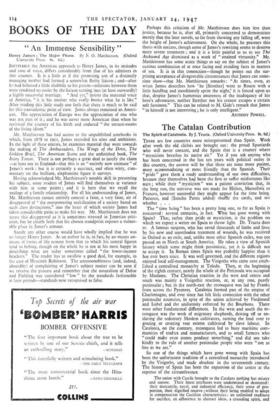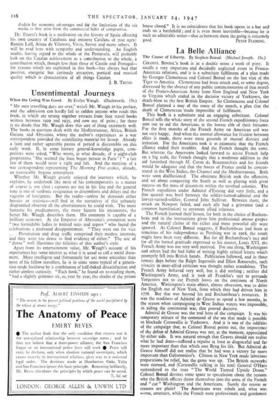The Catalan Contribution
The Spirit of Catalonia. By J. Trueta. (Oxford University Press. 8s. 6d.) THERE are few countries more misrepresented than Spain. Week after• week the old clichés are brought out: the proud Spaniards who will never consent, and the Spain that is a country where " mysticism breathes its native air." Yet if you ask anyone who has been concerned in the last ten years with political exiles in this country, the answer will be that there are none more patient, more accommodating or more friendly than the Spanish. Their " pride " gave them a ready understanding of our own difficulties, because they themselves had been the first to suffer misfortunes like ours ; while their " mysticism " was a patient conviction 'that, In the long run, the universe was not made for Hitlers, MussoliniS or Francos, however successful they might appear for the time being. Patience, and (Sancho Panza added) shuffle the cards, and see whether . . .
The " time being " has been a pretty long one, so far as Spain is concerned : several centuries, in fact. What has gone wrong with Spain? That, rather than pride or mysticism, is the problem on which we expect a writer on Spain to throw light. Dr. Trueta does so. A famous surgeon, who has saved thousands of limbs and lives by his new and unorthodox treatment of wounds, he was received in Oxford as an exile, and, unlike most other Spanish exiles, was not passed on to North or South America. He takes a view of Spanish history which some might think pessimistic, yet it is difficult not to accept it. In Roman times Spain was probably happier than it has ever been since. It was well governed, and the different regions enjoyed local self-management. The Visigoths who came next estab- lished a centralised monarchy at Toledo. Then, at the beginning of the eighth century, nearly the Whole of the Peninsula was occupied by Moslems. The Christian reaction in the west and centre and south was mainly a Visigothic reaction, or, at any rate, purely peninsular ; but in the north-east the reconquest was led by Franks from across the Pyrenees. Catalonia formed part of the empire of Charlemagne, and ever since has felt little connection with the Other peninsular countries, in spite of the union achieved by Ferdinand and Isabel and the uniformity enforced by the Bourbons. There were other fundamental differences. In the west and south the re- conquest was the work of migratory shepherds, driving off or en- slaving the sedentary Moslem cultivators, turning the land over to grazing or creating vast estates cultivated by slave labour. In Catalonia, on the contrary, reconquest led to busy maritime com- munities of traders and manufacturers, and to small farmers who " could make even stones produce something," and did not 'take kindly to the rule of another peninsular people who were "not as free as we are."
So one of the things which have gone wrong with Spain has been the unfortunate tradition of a centralised monarchy introduced by the Visigoths, and made absolute in the seventeenth century. The history of Spain has been the expansion of the centre at the expense of the circumference.
The union with Castile brought to the Catalans nothing but misery and sorrow. Their finest attributes were undermined or destroyed: their mercantile, naval, and industrial efficiency, their sense of pro- portion, their dignified reserve.; without their being enabled to adopt in compensation the Castilian characteristics: an unlimited readiness for sacrifice, an adherence to abstract ideas, a crusading spirit, and disdain for economic advantages and MI' the limitations of the via media as they arise from the commercial habit of compromise.
Dr. Trueta's book is a meditation on the history of Spain affecting his own country of Catalonia and eminent Catalans of past ages: Ramon Lull, Arnau de Vilanova, Vives, Servet and many others. It will be read here with sympathy and understanding. An English reader, having regard to the whole of the Peninsula, will probably look on the Catalan achievement as a contribution to the whole, a contribution which, though less than those of Castile and Portugal— for reasons which are explained in this book—has always had that positive, energetic but curiously attractive, poetical and musical quality which is characteristic of all things Catalan.
J. B. TREND.



































 Previous page
Previous page